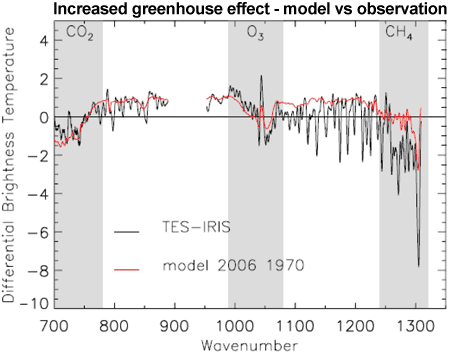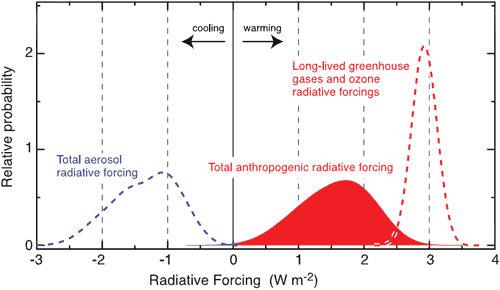


























Latest Posts
Archives
|
 |


Is the science settled?
Posted on 24 March 2010 by John CookA common skeptic refrain is that "the science isn't settled", meaning there are still uncertainties in climate science and therefore action to cut CO2 emissions is premature. This line of argument betrays a fundamental misunderstanding of the nature of science. Firstly, it presumes science exists in a binary state - that science isn't settled until it crosses some imaginary line after which it's finally settled. On the contrary, science by its very nature is never 100% settled. Secondly, it presumes that poor understanding in one area invalidates good understanding in other areas. This is not the case. To properly answer the question, "is the science settled?", an understanding of how science works is first required. Science is not about absolute proofs. It never reaches 100% certainty. This is the domain of mathematics and logic. Science is about improving our understanding by narrowing uncertainty. Different areas of science are understood with varying degrees of confidence. For example, while some areas of climate science are understood with high confidence, there are some areas understood with lower confidence, such as the effect on climate from atmospheric aerosols (liquid or solid particles suspended in the air). Aerosols cool climate by blocking sunlight. But they also serve as nuclei for condensation which leads to cloud formation. The question of the net effect of aerosols is one of the greater sources of uncertainty in climate science. What do we know with high confidence? We have a high degree of confidence that humans are raising carbon dioxide levels in the atmosphere. The amount of CO2 emissions can be accurately calculated using international energy statistics (CDIAC). This is double checked using measurements of carbon isotopes in the atmosphere (Ghosh 2003). We can also triple check these results using observations of falling oxygen levels due to the burning of fossil fuels (Manning 2006). Multiple lines of empirical evidence increase our confidence that humans are responsible for rising CO2 levels. We also have a high degree of confidence in the amount of heat trapped by increased carbon dioxide and other greenhouse gases. This is otherwise known as radiative forcing, a disturbance in the planet's energy balance. We can calculate with relatively high accuracy how much heat is trapped by greenhouse gases using line-by-line models which determine infrared radiation absorption at each wavelength of the infrared spectrum. The model results can then be directly compared to satellite observations which measure the change in infrared radiation escaping to space. What we find in Figure 1 is the observed increased greenhouse effect (black line) is consistent with theoretical expectations (red line) (Chen 2007). These results can also be double checked by surface measurements that observe more infrared radiation returning to Earth at greenhouse gas wavelengths (Evans 2006). Again, independent observations raise our confidence in the increased greenhouse effect. 
Figure 1: Increased greenhouse effect from 1970 to 2006. Black line is satellite observations. Red line is modelled results (Chen 2007).
So we have a lower understanding of aerosol forcing and a higher understanding of greenhouse gas forcing. This contrast is reflected in Figure 2 which displays the probability of the radiative forcing from greenhouse gases (dashed red line) and aerosol forcing (dashed blue line). Greenhouse gas forcing has a much higher probability constrained to a narrow uncertainty range. Conversely, the aerosol forcing has a lower probability and is spread over a broader uncertainty range. 
Figure 2: Probability distribution functions (PDFs) from man-made forcings. Greenhouse gases are the dashed red curve. Aerosol forcings (direct and indirect cloud albedo) are the blue dashed curve. The total man-made forcing is the solid red curve (IPCC AR4 Figure 2.20b)
The important point to make here is that a lower understanding of aerosols doesn't invalidate our higher understanding of the warming effect of increased greenhouse gases. Poorly understood aspects of climate change do not change the fact that a great deal of climate science is well understood. To argue that the 5% that is poorly understood disproves the 95% that is well understood betrays an incorrect understanding of the nature of science.  0 0  0 0
Printable Version | Link to this page
There is another strong reason for considering the general picture of AGW as settled. The reason is that there is no alternativ theory that explains the climate record we have.
With a "theory" I mean a model with an underpinning in theoretical science (physics), which does give precise verifiable predictions. Such a theory is vulnerable in many ways - a climate theory can be falsified by inconvenient data from this century, by various historical data going back millions of years, by attacks on its theoretical foundations etc. The more possibilities to falsify it, the better for the theory: If the attacks don't kill it, they strengthens it.
AGW has survived a strong onslaught for a long time. There is no alternative climate theory which has an even faintly resembling status. There are some thoughts which have ended up as "skeptical arguments" on this site, but nothing coherent, nothing that has a strong theorertical backing and gives predictions (or post-dictions) for a large number of measurable quantities.
The fact that there are so many "skeptical arguments" shows that AGW is a strong theory - it can be attacked in many ways.
Don't misunderstand me. Actually I see a lot of weak spots and unclear areas in the AGW theory. But it is an honest, falsifiable theory. And no one has been able to come up with a competing explanation with an even faintly resembling status.
I'm sure there will be modifications of the climate models, as we come to understand the climate better. But I don't see even the beginning of a "paradigm shift" away from AGW. There is no new paradigm in sight to build that shift around.
 0 0  0 0 0 0  0 0 0 0  0 0 0 0  0 0 0 0  0 0 0 0  0 0 0 0  0 0 0 0  0 0 0 0  0 0 0 0  0 0 0 0  0 0 0 0  0 0 0 0  0 0 0 0  0 0 0 0  0 0 0 0  0 0 0 0  0 0 0 0  0 0 0 0  0 0 0 0  0 0 0 0  0 0Response: "What stopped natural runaway warming in the past? Negative feedbacks?"
This is a very interesting question - I've been reading about this in Hansen's Storms of my Grandhildren. There are a number of factors. One is that the sun's output was lower back in the days when CO2 was much higher (in fact, it is BECAUSE the sun's output was lower that CO2 was higher but that's a discussion for another time).
Another factor is that warming in the past was over geological time periods, thousands or millions of years, so over these periods, negative feedbacks have stopped natural runaway warming. This is because negative feedbacks also act over thousands or millions of years - continental weathering removes CO2 from the atmosphere, terrestrial sinks absorb CO2, etc.
The difference between then and now is that current warming is happening so fast that these long-term negative feedbacks don't have time to make a significant impact in slowing down the warming. I find this a particularly fascinating (albeit disturbing) subject and would like to take some time to track down Hansen's references and write a post about it. Now, to find some time...
From what I've read, CO2 by itself, can raise atmospheric temps by maybe 2oC, and the global climate models have to assume that cloud effects must provide positive reinforcement for CO2 to raise temps further. It also is my understanding that scientists are divided on whether clouds provide positive or negative reinforcement, and by how much.
Is it not the case that until cloud effects are better understood, the case for AGW will remain truly unsettled?
 0 0  0 0Response: "Is it not the case that until cloud effects are better understood, the case for AGW will remain truly unsettled?"
Arguably the key question surrounding global warming is climate sensitivity. I didn't touch on it in this post as I'm planning to devote a post on this subject shortly. We've established empirically that more CO2 is trapping more heat which raises temperatures. The big question is whether feedbacks amplify or reduce this warming. When you add up water vapor, clouds, ice sheet albedo, etc, is the net feedback positive or negative? And how big is it?
We can sidestep the issue of all the various individual feedbacks and jump straight to the question of net feedback by looking at empirical data - how has climate responded to forcings in the past? A multitude of studies, looking at different periods, using different metrics, all tend to cluster around a single answer - the climate sensitivity for doubled CO2 is 3°C.
This gives us the final overall answer to how climate will respond to rising CO2. The net feedback is positive and the climate is fairly highly sensitive to changes in energy balance. So while we have a lower understanding of the individual feedback components, multiple lines of empirical observations give us a higher understanding of the net feedback response.
'Moralising about grandchildren is pointless - I see your future warming and raise you stunted economic growth in the developing world."
I see one as more deadly than the other and I am unconvinced about the "stunted economic growth" bit in developing world. They can use renewables too. At least they are no WORSE off if their fossil fuel use is capped and developed world reduces.
This is still frankly dodging the risk analysis. You want to trust an unknown and probably non-existent model rather than a known and working one on grounds that have no basis in science.
daisym: There is at least a reasonable convergence between model estimates of sensitivity and empirical estimates. These alluded to uncertainties have been greatly reduced between TAR and AR4.
 0 0  0 0 0 0  0 0 0 0  0 0 0 0  0 0 0 0  0 01 2 Next
You need to be logged in to post a comment. Login via the left margin or if you're new, register here.
|

|





The Consensus Project Website
THE ESCALATOR

(free to republish)
|

































 Arguments
Arguments

































- Atmospheric carbon dioxide level is increasing
- CO2 does absorb (and emit) IR radiation at certain wavelengths
It is a far cry from demonstrating it makes Earth warmer indeed.